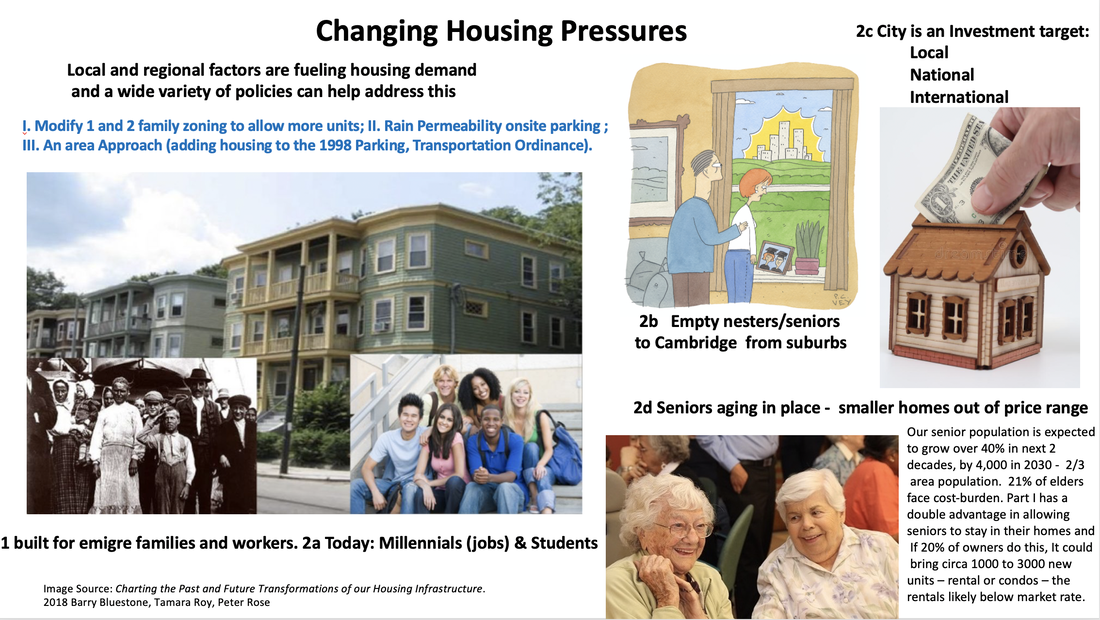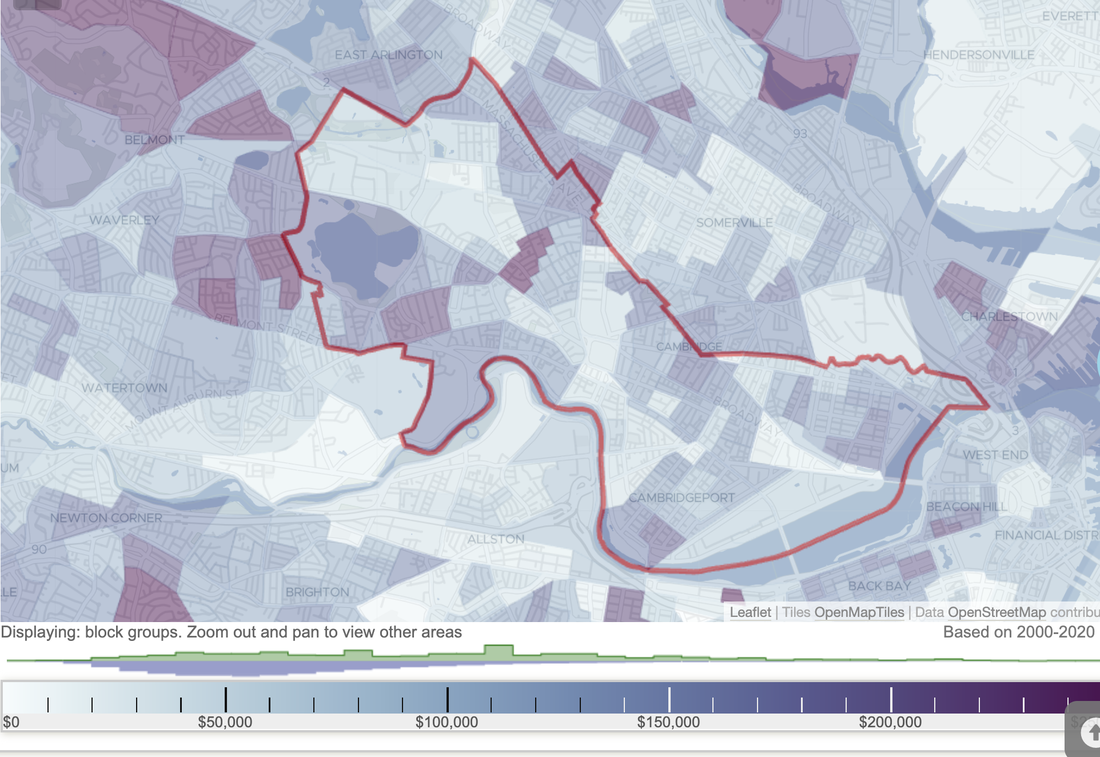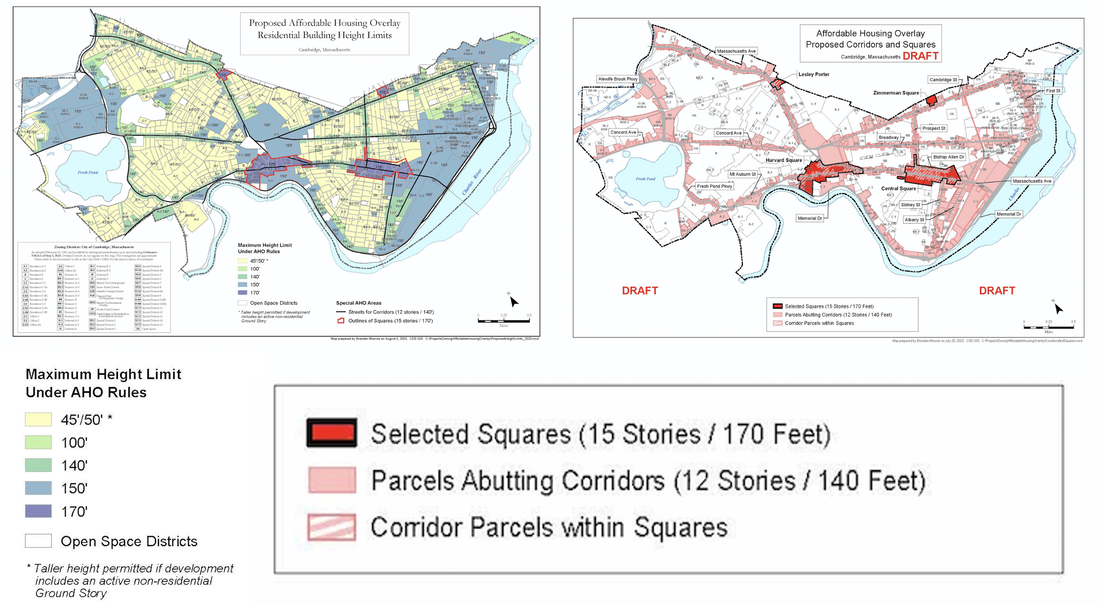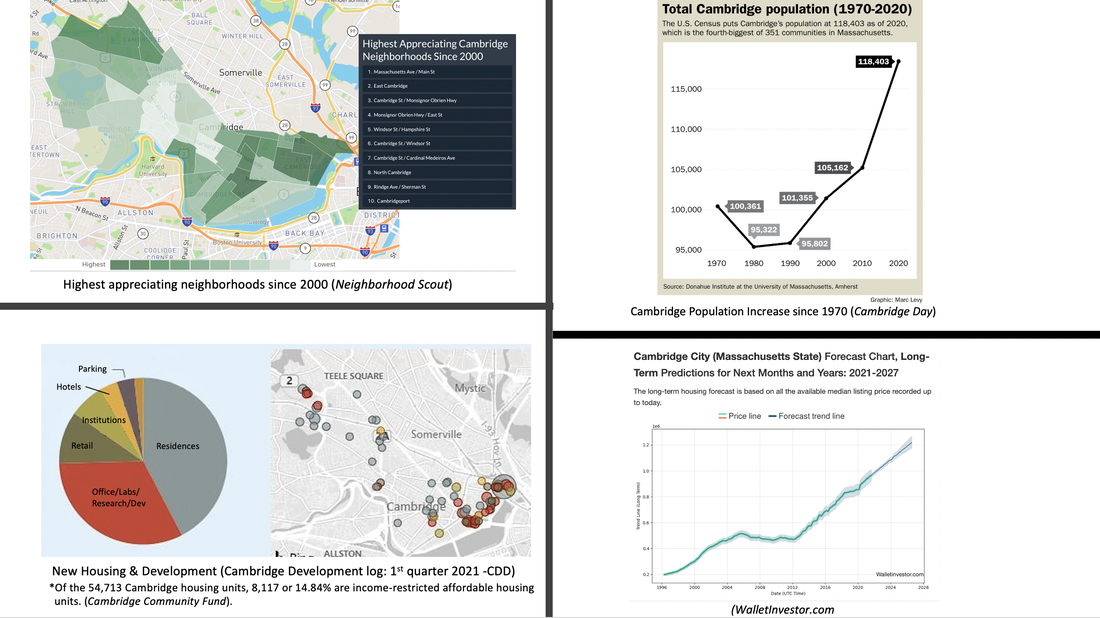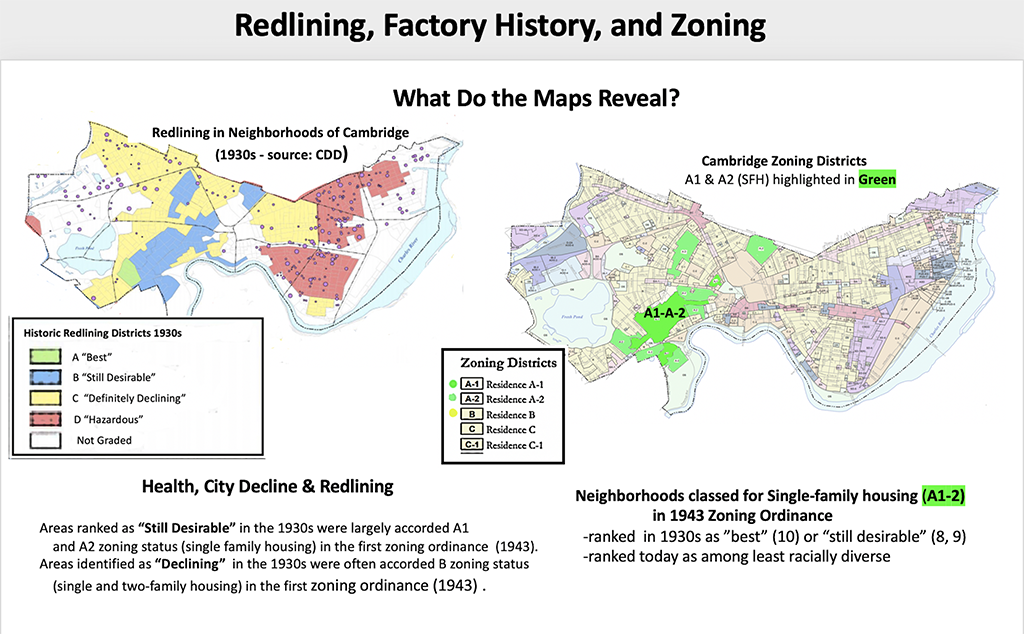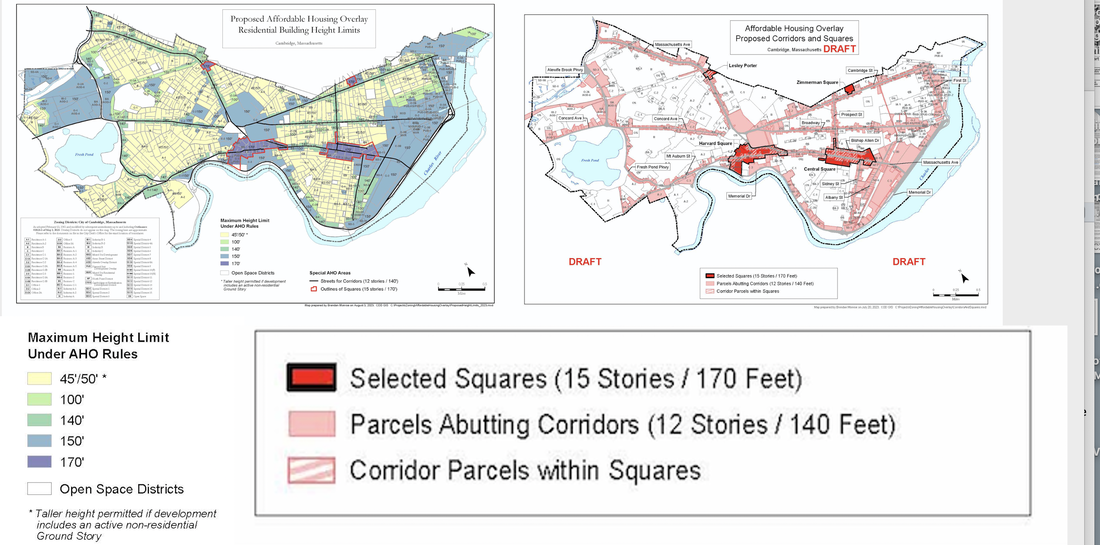Cambridge has a rich housing history that informs where we are today and what issues we need to think about in addressing the future!
Cambridge Wealth Demographics Have Changed Substantially in the last couple of decades. While some political animus continues to be directed at parts of West Cambridge, much of the newer wealth is moving into North Cambridge, Mid-Cambridge, Kendall Square and East Cambridge and other areas due to increasing gentrification of the city.
source: www.city-data.com/city/Cambridge-Massachusetts
AHO - Where we are in 2023
According to one estimate, since AHO 1.0 was adopted in October 2020, just under 3 years ago, a total of 616 100% affordable units to be deed-restricted in perpetuity are in the pipeline. The goal of Envision Cambridge for new affordable housing units to be built from 2019 to 2030 (a span of 12 years), is 1724 new SHI units based on 25% growth of SHI units according to the 2020 census data. Extrapolating the number of AHO rental units over 3 years, AHO as currently in the books, would produce 2,464 100% affordable deed-restricted units, comprising 78% of the currently stated Envision Cambridge goal, and therefore exceeding the suggested goal.
AHO 2.0 citywide up-zoning ordained by City Council in Oct. 2023.
City Councillors supporting the large citywide AHO 2.0 up-zoning are Councillors Azeem, McGovern, Simmons, and Siddiqui as well as Mallon and Zondervan (the latter two are not running for reelection).
City Councillors who oppose AHO 2.0 include Councillors Nolan and Toner as well as Carlone (the latter not running for reelection).
Likely impacts: removal of historic Cambridge homes and other buildings, loss of mature trees, and critical green spaces. With no parking or required drop off areas, traffic and parking problems will likely increase. Without our standard Planning Board large project oversight of AHO building design, these new large scale structures may not meet the level of design oversight of other city large projects - or neighbor imput. For AHO buildings, the Planning Board role is only advisory not mandatory unlike other projects. Adjacent homes and other buildings will be impacted by the 12 and 15 story buildings being erected which will block sunlight to neighbors and many blocks away. With little if any financial oversight, the new AHO units likely will cost tax payers nearly $1 million apiece (even without land costs) -double what market rate housing costs).
City Councillors supporting the large citywide AHO 2.0 up-zoning are Councillors Azeem, McGovern, Simmons, and Siddiqui as well as Mallon and Zondervan (the latter two are not running for reelection).
City Councillors who oppose AHO 2.0 include Councillors Nolan and Toner as well as Carlone (the latter not running for reelection).
Likely impacts: removal of historic Cambridge homes and other buildings, loss of mature trees, and critical green spaces. With no parking or required drop off areas, traffic and parking problems will likely increase. Without our standard Planning Board large project oversight of AHO building design, these new large scale structures may not meet the level of design oversight of other city large projects - or neighbor imput. For AHO buildings, the Planning Board role is only advisory not mandatory unlike other projects. Adjacent homes and other buildings will be impacted by the 12 and 15 story buildings being erected which will block sunlight to neighbors and many blocks away. With little if any financial oversight, the new AHO units likely will cost tax payers nearly $1 million apiece (even without land costs) -double what market rate housing costs).
AHO 2.0 Citywide Upzoning Amendment: City Council Vote in October 2023
"It may seem obvious that cities filled with big buildings use energy more efficiently than dispersed suburban landscapes, and that newer, taller buildings are more energy-efficient than older, squatter structures. People widely understand that New York City, for example, ranks well on energy use per person, where housing tends toward the vertical, one boiler room can serve many units, and heat rises into the units above, rather than being lost to the sky....Skyscrapers use and lose more energy than low-rise buildings, research shows.... 'The results show that height is a significant predictor of energy use, even accounting for other variables,'the researchers wrote in a paper published in the journal Building Research and Information. In fact, each additional story in a building is associated with a 2.4 percent increase in electricity use and 2.9 percent increase in fossil fuel use, more than doubling the average emissions per square foot for the tallest buildings in their survey." Source: Greentech Media November 2020 (read article at link below).
AHO 2.0 citywide upzoning amendment before City Council (October 2023)
MORE documents on Housing (in Cambridge and Globally) also are found under our
CCCoalition.org Envision Tab
LOCAL CENTER WITH INFORMATION ON HOUSING ISSUES
Harvard Joint Center for Housing Studies (in part Industry funded) https://www.jchs.harvard.edu/
Harvard Joint Center for Housing Studies (in part Industry funded) https://www.jchs.harvard.edu/
"Asking for -profit developers to fix the affordable housing problem is like asking an arsonist to put out their own fire. What is their incentive?" (The Black Response Cambridge on the Upzoning Petition: "Missing Middle Fails for Housing Affordability")
According to the above report, as of March 23, 2023, there are 1497 units under construction or completed
IMPACTS OF CHANGING HOUSING POLICY ON THE GROUND
One can readily see the neighborhood impacts of changing housing policy in Cambridge in recent decisions regarding housing within the Affordable Housing Overlay (AHO context. More on the AHO impacts of AHO 1.0 and the proposed AHO 2.0 amendment below.
On August 7, Cambridge City Council will vote on the vast AHO-2.0 citywide up-zoning (see section below for more details on the specific proposal)
LOCAL HOUSING STUDIES
Areas of Rapidly Changing Property Values (Property Investments) and New Building
Existing Neighborhood Conservation Districts and Historic Districts in Cambridge are in areas of the city that have increased in value and investments less radically, meaning that housing here is more stable, and gentrification is less impactful,
Cambridge Has Long Been a State and National Leader in Building Affordable Housing (and has added far more housing than required)
AFFORDABLE HOUSING DEVELOPERS
Non-Profit
Documents on Affordable Housing
CAMBRIDGE HOUSING & ZONING-RELATED DOCUMENTS
In Cambridge, unlike some places elsewhere, our once thriving factory history had far more impact on zoning and red-lining than racial discrimination did. Indeed our first African American neighborhoods were in the A1 and A2 areas today.
ALL of our current housing is legal, even if situated in city areas prior to current zoning rules. Any residential structure that is destroyed (in fire for example) can be rebuilt to its current footprint or height. Three story buildings ("triple-deckers") can still be built, but to different interior design guidelines due to fire hazards associated with the original "triple-decker" format.
CAMBRIDGE RESIDENTIAL ZONING PETITIONS
AHO 2.0 (Affordable Housing Overlay) UP-ZONING PETITION AMENDMENT (Vote August 7, 2023)
AHO 1.0 (Affordable Housing Overlay) PETITION Ordained in 2021
Brown Petition for Incrementally Modernizing Residential Zoning
Franklin Restore Cambridge Housing Zoning Petition
DONOVAN - AHA (Advancing Housing Overlay) PETITION (Not Ordained)
MMH (Missing Middle Housing) PETITION (Not Ordained) SEE BELOW
Why CCC Opposed the MMH Housing Petition
Illustration Below: Impacts of Missing Middle Housing (MMH) LuxuryHousing Petition
WE ARE ALREADY IN A HOUSING CRISIS - DO WE REALLY WANT TO MAKE IT WORSE?!
GLOBAL AND NATIONAL HOUSING PERSPECTIVES
Local, Regional, and Global Perspectives on Supply, Demand Myths, Zoning, and Real Equity Impacts and recent CCC perspectives about housing petitions in the city.
AHO (AFFORDABLE HOUSING PETITION) 1.0 (CONTINUED)
We NEED BOTH More Housing & Housing Affordability
But Cambridge Cannot House Everyone Who Wants to Live Here:
& Cambridge is not big enough to provide properties for all who want to invest here
But Cambridge Cannot House Everyone Who Wants to Live Here:
& Cambridge is not big enough to provide properties for all who want to invest here
There are currently c.3,000-3,500 Cambridge city residents on the affordable housing list. We can indeed find housing for this group through thoughtful planning and building the requisite housing on city owned property, and asking the city acquire property specifically for this purpose. We could even help at least half these residents build equity by providing down payments (or working with local banks to do so) for these Cambridge residents to purchase homes within these city owned properties. Building towering 25 story skyscrapers for segregated housing is a model that failed when the federal government did it in the fifties. Here we are not even required to provide green spaces, trees, or parking so people can get to work and back, to say nothing of the needed infrastructure to make this work. The so-called 21,000 wait list – is one that seems never to have been cleared and comprises people throughout the area (and country) who would like to live in Cambridge (or anywhere in some cases).
Cambridge is c.6 square miles (far smaller than Boston – which has a smaller list) and we are a very dense (city top 4-5 in the country with a population over 100K). We already have exceeded state goals on housing because we are an exceedingly generous community (a good thing) and way surpass most other area and state municipalities. We are a good and moral city but we need to be advancing far more thoughtful policies that are practical, sustainable, and will make a real difference. What we need is an actual city plan (block by block) that includes affordable and mixed income housing, viable nearby transportation (15 minutes to reach other areas of the city), as well as more green spaces and parks (particularly in our denser neighborhoods) and trees (it is this that keeps down devastating heat island impacts (adding to both environmental and health inequities). In short we ned to focus on smart city policies that get proven results, and help people build equity, rather than an array of ideologically driven policies.
Are there studies/info that show causality/correlations between AH, impacts on housing market and equity/wealth gap? Yes - elsewhere. One of the most important professionals is an urban planner who lives in Vancouver who has long argued that adding more housing often increases housing costs in high density/high demand cities like Vancouver (and Cambridge). He argues that the very best way to address housing needs is to build on city-owned land because then you are not increasing property values, housing costs, and taxes often on those who cannot afford them. See his recent analysis on “Why More Housing Supply Won’t Solve Affordability” here: https://vancouversun.com/opinion/columnists/douglas-todd-why-more-housing-supply-wont-solve-unaffordability
He offers 5 key reasons, one of which is that a frenzy of outside investors are buying up housing stock. That is also what is happening here (in spades). Another is that we (like Vancouver) are hemmed in geographically and have no way to grow outward.
Cambridge is c.6 square miles (far smaller than Boston – which has a smaller list) and we are a very dense (city top 4-5 in the country with a population over 100K). We already have exceeded state goals on housing because we are an exceedingly generous community (a good thing) and way surpass most other area and state municipalities. We are a good and moral city but we need to be advancing far more thoughtful policies that are practical, sustainable, and will make a real difference. What we need is an actual city plan (block by block) that includes affordable and mixed income housing, viable nearby transportation (15 minutes to reach other areas of the city), as well as more green spaces and parks (particularly in our denser neighborhoods) and trees (it is this that keeps down devastating heat island impacts (adding to both environmental and health inequities). In short we ned to focus on smart city policies that get proven results, and help people build equity, rather than an array of ideologically driven policies.
Are there studies/info that show causality/correlations between AH, impacts on housing market and equity/wealth gap? Yes - elsewhere. One of the most important professionals is an urban planner who lives in Vancouver who has long argued that adding more housing often increases housing costs in high density/high demand cities like Vancouver (and Cambridge). He argues that the very best way to address housing needs is to build on city-owned land because then you are not increasing property values, housing costs, and taxes often on those who cannot afford them. See his recent analysis on “Why More Housing Supply Won’t Solve Affordability” here: https://vancouversun.com/opinion/columnists/douglas-todd-why-more-housing-supply-wont-solve-unaffordability
He offers 5 key reasons, one of which is that a frenzy of outside investors are buying up housing stock. That is also what is happening here (in spades). Another is that we (like Vancouver) are hemmed in geographically and have no way to grow outward.
CCC Supported the People's Housing Rally Opposing the Missing Middle Housing Petition
On June 17, 2021, many CCC leaders were out in support of a housing rally. the Peoples Housing Rally, opposing the misnamed Missing Middle Housing petition that sought to up-zone the whole city to add more luxury (market-based) housing in backyards and other areas (see images below).
